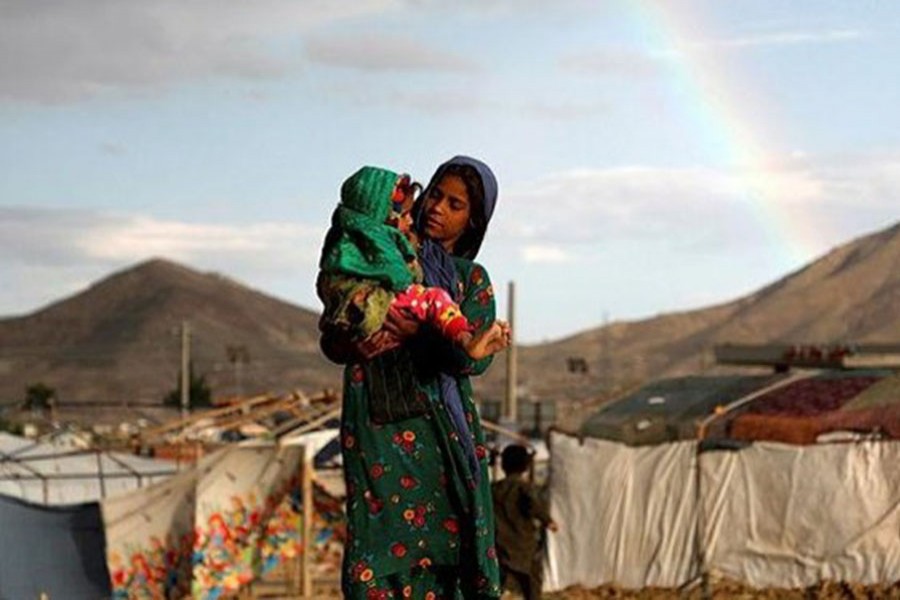Women’s rights supporters and faith leaders are calling for a United Nations peacekeeping force for Afghanistan to protect hard-won gains for women over the last two decades as American and NATO forces complete their pullout from the war-torn country and a Taliban offensive gains control over more territory.
Under the Taliban, women were not allowed to go to school, work outside the home or leave their house without a male escort. And though they still face many challenges in the country’s male-dominated society, Afghan women have increasingly stepped into powerful positions in numerous fields — and many fear the departure of international troops and a Taliban takeover could take away their gains.
In a May 14 letter obtained by The Associated Press, 140 civil society and faith leaders from the U.S., Afghanistan and other countries “dedicated to the education and rights of women in Afghanistan” asked U.S. President Joe Biden to call for a U.N. peacekeeping force “to ensure that the cost of U.S. military withdrawal from Afghanistan is not paid for in the lives of schoolgirls.”
The letter also asked the U.S. to increase humanitarian and development aid to Afghanistan “as an important security strategy” to strengthen women and girls and religious minorities like the Hazaras. Three bombings at a high school in a Hazara neighborhood in Kabul on May 8 killed nearly 100 people, all of them Hazara and most of them young girls just leaving class.
The signatories blamed the Trump administration for failing to honor a U.N. Security Council resolution adopted in 2000 demanding equal participation for women in activities promoting global peace “by refusing to insist that women were part of the peace talks” with the Taliban.
Sakena Yacoobi, the founder of the Afghan Institute of Learning which runs schools across 16 provinces, is quoted in the letter as saying: “For 20 years the West told the women of Afghanistan they are free. Free to learn, to grow, to be a human being independent of men’s expectations of who they are.”
“What the Taliban did in the 1990s was bad enough,” she said. “What will they do now, with a generation of women taught to expect freedom? It will be one of the greatest crimes against humanity in history. Help us save them. Please. Help us save who we can.”
Among the signatories of the letter were Yacoobi; feminist activist and writer Gloria Steinem; former U.N. deputy secretary-general Mark Malloch Brown who now heads the Open Society Institute; Filmmaker and philanthropist Abigail Disney; former UNICEF executive director Carol Bellamy; Betty Reardon, the International Institute on Peace Education’s founding director emeritus; The Rev. Dr. Chloe Breyer, executive director of The Interfaith Center of New York; Masuda Sultan, co-founder of Women for Afghan Women; and Nasir Ahmad Kayhan, UNESCO programme manager in Afghanistan.
In April the Taliban promised that women “can serve their society in the education, business, health and social fields while maintaining correct Islamic hijab.” It promised girls would have the right to choose their own husbands, but offered few other details and didn’t guarantee women could participate in politics or have the freedom to move unaccompanied by a male relative.
Deborah Lyons, the U.N. special envoy for Afghanistan, told the Security Council on June 22 that “preserving the rights of women remains a paramount concern and must not be used as a bargaining chip at the negotiating table.”
In a follow-up letter on July 12 to U.S. Ambassador Linda Thomas-Greenfield, a wider international group expressed deep concern “for the lives and well-being of the people of Afghanistan, especially women and girls now under great threat” and called for a U.N. peacekeeping mission to deploy to Afghanistan “as soon as practically possible.”
The signatories said they are convinced the 2000 Security Council resolution obliges U.N. member states “to protect women in such circumstances.”
The United Nations has a political mission in Afghanistan. A U.N. peacekeeping mission would have to be approved by the Security Council, where the five permanent members -- the U.S., Russia, China, Britain and France -- have veto power.
The letter to the U.S. ambassador said similar messages were being sent to other U.N. ambassadors from citizens in their countries asking for a peacekeeping operation. It asked Thomas-Greenfield to “take action toward the initiation of a peacekeeping operation in Afghanistan.”
A U.S. mission spokesperson did not respond to a request for comment on the call for a U.N. peacekeeping force, instead stressing Thursday that the Biden administration will continue to support Afghan forces and U.S. “diplomatic, humanitarian and economic engagement in the region.”
“We are putting our full weight behind diplomatic efforts to reach a peace agreement between the Taliban and the Afghan government,” said the spokesperson, who could not be named, adding the U.S. remains the largest aid donor to Afghanistan and continues to support the U.N. political mission known as UNAMA.


